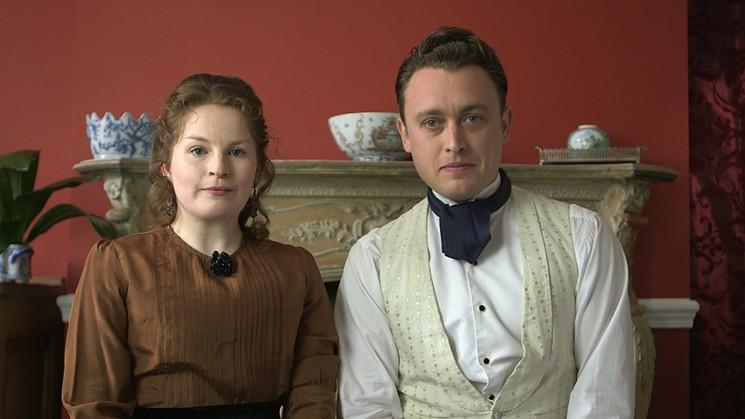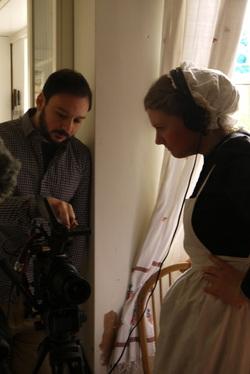The Spread talks to writer/director/star Caitlin Shannon and DOP/producer Daniel Fazio about their exquisite period piece comedy web series Wimpole Street.

Caitlin and Daniel on set.
Wimpole Street is an award-winning comedy web series that has played at festivals around the world and already garnered international praise and coverage from its two series run online and at festival screenings. We chatted to two of the most important people behind the series (creator and star Caitlin Shannon and DOP/producer Daniel Fazio) about how they did it, why Victorian London turned out to be a hotbed for comedy gold and what the future holds.
What was the genesis of Wimpole Street? How did the idea come about, was the format and the time period all fully formed or did it develop over time?
CS: I was doing the play ‘Gaslight’ with Mia Austen and Sarah Simpkins, who play Rosamund and Mrs.Dippy, and we were enjoying playing Victorian characters. We sort of ‘lived’ in that world and time period for a few months, somehow, out of that experience, I had the idea to write a Victorian comedy. This idea eventually morphed into the idea of a ‘mockumentary’. I wrote an early draft then and there, and we did an initial reading. At the time it was a sitcom pilot - it wasn’t until several years later I had the idea to turn it into a web series.
DF: I met Caitlin on recommendation of a mutual, actor, friend who said Caitlin needed a DOP for an exciting web series project. I read the script and was intrigued. As soon as we met and began discussing the possibilities of the format and visual language, I was quickly convinced I wanted to be a part it. As I became enamoured with the project I proposed to take a more prominent role and help Caitlin produce as well, betting on this little gem. It all came from her imagination and determination; I made some resources available to the project in the form of equipment, post production support and some assistance with the production side of things. The collaboration intensified on series two, where Loft Films, the production company I run, took on the project more prominently with a view to develop it further.
The production design (the setting, the costumes, hair and makeup) are all outstanding. How long does it take to assemble everything for each series?
CS: The process for series one was a little longer than series two, as it took some time to establish the visual language. On series one, Liz Evans and Emily Barratt helped to choose costumes for each character, and we spent a lot of time talking about what little items of clothing defined each character. The actors themselves were also instrumental in this conversation. Francis White was our production designer on series one and she was incredibly detail oriented, trawling shops - and begging, and borrowing - for the right copper pans and and jugs and rolling pins and plants to have in shot. She and Ashleigh Latter, our designer on series two, also found some fantastic vintage materials to use on camera - they helped create a vivid, colourful picture.
DF: I was interested in the idea of making something fairly simple, to let the acting shine through and allow us to create visual richness on a limited budget. We played with the idea of adopting a hand held, doc style look but quickly settled on a static camera and the idea of breaking the fourth wall, establishing the device of the reporter’s gaze.

How did the cast come together? The household are all very clearly defined characters, were they developed with the actors or did you have to find actors to fit those roles?
CS: As I mentioned, Mia Austen and Sarah Simpkins were on board right from the beginning, and I did write their roles with them in mind - I also wrote Daisy for myself! Some of the other roles developed over time. I initially conceived the butler, Nelson, as an older character, think John Gielgud in Arthur, but now I couldn’t imagine anyone but Simon Yadoo playing the role. Each actor has really put their own unique stamp on their role. I feel incredibly lucky to have found such a fantastic cast.
Showing a long-form story with character development through the documentary, interview, style must be a challenge in itself. Is it all clearly defined and broken down in the script or does it come together more during the editing process?
CS: The series is about 85% scripted; and certainly the arc of each episode is clearly defined beforehand. But I think some of the most golden moments have come out of improv. The actors understand their characters so implicitly, that they’re really able to play and have fun with them. A lot of the actors also know each other well, and have a shorthand with each other. I don’t think I’m giving anything away when I say that Catherine Skinner who plays Gertrude and Sam Wilkin who plays Matthew, the forever engaged couple, are actually married in real life. I think their chemistry is certainly reflected on screen.
I do think editing has an important role to play as well - timing is everything, and it’s not until you get to the edit you can really define the scenes to make them as punchy and funny as possible.
British film and TV always seems to thrive in a period setting, particularly around the 19th and early 20th century, why do you think that is?
CS: I’m not quite sure. I hope it’s not because our country is stuck in the past, but it might be! I think there’s always quite a lot of comedy to be found in a society that has strict social and moral codes, and perhaps that’s one reason why we mine the past. I enjoy the enjoy the micro-dramas that emerge from Victorian life - for instance, the politics of a calling card!
DF: I think Victorian London plays in to the romantic fantasy that people outside the UK, particularly Americans, have about British society. It’s a sort of revered exoticism that many audiences find satisfying. I think we have managed to tap into that archetype while putting a modern twist on it to make it more relatable to the online audiences of today.
What’s your favourite reaction to Wimpole Street been so far?
CS: I was of course really excited when we won two awards at Seattle Web Fest (Best Director and Best Comedy). But I think the best comment I received the other day was from someone who said they keep watching and re-watching the episodes because they cheer them up on a tough day. That was really great to hear.
What’s the future of Wimpole Street? Are there plans for a third series? Do you think the idea could expand to another time and setting one day, like Blackadder?
CS: We’d certainly like to keep going, if everyone is willing! It would be a shame not to finish out story arc and make a third series. And yes! I quite like that Blackadder idea - why not keep going?
DF: We are certainly considering a third series to complete the story and are also looking at the possibility of translating the format to other platforms like TV or streaming services. I think the strength of the project lies in great characters, played masterfully by a close-knit cast of excellent actors. The Victoria setting helps exasperate these positive qualities while anchoring the format to a recognisable British brand.

